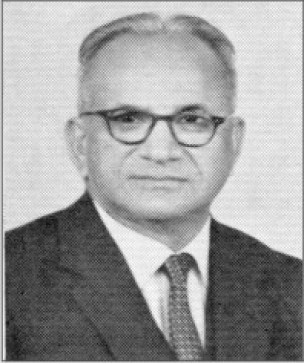R.S. Vasudeva

| Name | R.S. Vasudeva |
| Designation | President |
| Complete postal Address with city code | Indian Phytopathological Society |
| Email IDs | xyz@gmail.com |
| Mobile No. | 123456789 |
Brief Biodata
A well known phytopathologist Dr. Raghunath Sahai Vasudeva died at Delhi on 4th February, 1987. Born at Sahiwal, district Sargodha (now in Pakistan) in 1905, he had his early education at the D.A.V. School, Lahore and graduated from the Government. College, Lahore in 1926. He joined Imperial College of Science and Technology in London in 1927 to pursue his chosen field of research in Plant Pathology under the able guidance of Professor William Brown, FRS. He was awarded the degree of Ph.D. in 1930 but continued his post-doctoral research on physiology of parasitism of certain fungi and antibiosis.
On return to India in 1932, he was appointed mycologist for investigation on root-rot of cotton, a soil borne disease, which had baffled many eminent scientists. He not only established the true cause of disease but also evolved simple measures for its control, which were considered to be novel. These included such recommendations as growing of 'moth' (Phaseolus aconitifolius) as intercrop with cotton, which reduced soil temperatures because of its spreading nature and thus inhibited the growth of the causal fungi. This work later earned him the degree of D.Sc. of London University.
In 1940, Dr. Vasudeva joined Imperial Agricultural Research Institute (now Indian Agricultural Research Institute) at New Delhi and took up investigations on certain virus diseases of crop plants. At this time, the second world war increased the demand of dehydrated potato for forces and placed tremendous pressure on scientists and farmers to increase potato production. Dr. Vasudeva immediately took up this challenge through the introduction of potato seed certification scheme which was highly successful. The impact on increased yield in potato crop through the use of healthy virus-free seed, made the Government realise the importance of the role of plant viruses and their control. Thus, he was able to establish a strong section of plant virology in the department with three substations located at Kalimpong in the East, Pune in the West and Simla in the North India. This later became a pattern for similar development for plant virus research in various states and universities in the country. This also contributed to the starting of a separate Central Research Institute for Potato.
Dr. Vasudeva worked on diverse fields of
mycology and plant pathology. He published over 200 scientific papers on the
physiology of parasitism, antibiosis, fungal and virus diseases which were
published in Indian and International journals of repute. He is also author of
a number of scientific books including a revised edition of Fungi of India,
which is widely consulted by the mycologists and plant pathologists.
Dr. Vasudeva was the Head of the Division of Mycology and Plant Pathology from 1947 till his retirement with an additional charge, first as Assistant Director and later onJoint Director of the Indian Agricultural Research Institute from 1951 onward. He also worked as Director of the same Institute in 1955 and 1958 for brief periods. He was elected President of Agricultural Sciences Section of the Indian Science Congress and worked as technical member of a number of specialist bodies of the commodity committees set up by the Government of India. He was elected twice President of the Indian Phytopathological Society in 1953 and 1958, a rare honour shared by him by late Dr. B. B. Mundkur and Dr. M. J. Thirumalachar. He was Chief Editor of Indian Phytopathology for six years. He was a Fellow of the National Institute of Sciences in India and Honorary Fellow of the Indian Phytopathological Society.
Dr. Vasudeva
represented India in several international biological conferences. He visited
U.S.A. under leaders exchange programme in 1953 and later as a member of the
scientists delegation sent by the Government of India. His services were placed
at the disposal of Food and Agricultural Organization of the United Nations
(FAO) in 1955 for a short time to study the kadang kadang disease of coconut of
unknown etiology.
Dr. Vasudeva
was appointed as advisor for Plant Pathology by the FAO in Togo (West Africa)
in 1962, where he established Institute of Plant Pathology and supervised
research on the mysterious Kankope diseases of coconut and also advised Dahomey
on Plant Pathological research during the same period. On the termination of
this project, he was posted as advisor to develop Plant Pathological Research
Projects in Cuba. He finally retired from FAO in 1969 after working as
consultant at Rome for about a year. He also held a few assignments with World
Bank as consultant for brief periods.
Dr. Vasudeva
had a genial personality and was a strict disciplinarian. Though having a stern
posture outwardly, he was kind hearted. He trained several students, who occupy
coveted research positions in the country and abroad. He was married to Miss
Krishna Luthra, daughter of a noted agricultural scientist, Rai Bahadur Jai
Chand Luthra in 1934.
Dr. Vasudeva
had a frail health but was active till the last moment. He passed away
peacefully sitting in a chair in his home at Vasant Vihar, while talking to a
British friend. His life and work will continue to inspire many young
scientists. He is survived by his wife, a daughter Dr. Kusum Vasudeva, a
Gynaecologist and a son Mr. Karan Vasudeva, an engineer, both of whom are
reputed scientists working in U.S.A.